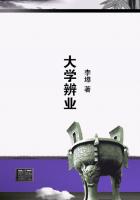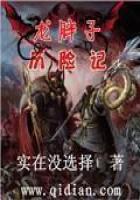The favourite evolutionary argument finds its best answer in the axe. The Evolutionist says, "Where do you draw the line?" the Revolutionist answers, "I draw it HERE: exactly between your head and body." There must at any given moment be an abstract right and wrong if any blow is to be struck; there must be something eternal if there is to be anything sudden. Therefore for all intelligible human purposes, for altering things or for keeping things as they are, for founding a system for ever, as in China, or for altering it every month as in the early French Revolution, it is equally necessary that the vision should be a fixed vision.
This is our first requirement.
When I had written this down, I felt once again the presence of something else in the discussion: as a man hears a church bell above the sound of the street. Something seemed to be saying, "My ideal at least is fixed; for it was fixed before the foundations of the world. My vision of perfection assuredly cannot be altered; for it is called Eden. You may alter the place to which you are going; but you cannot alter the place from which you have come.
To the orthodox there must always be a case for revolution; for in the hearts of men God has been put under the feet of Satan.
In the upper world hell once rebelled against heaven. But in this world heaven is rebelling against hell. For the orthodox there can always be a revolution; for a revolution is a restoration.
At any instant you may strike a blow for the perfection which no man has seen since Adam. No unchanging custom, no changing evolution can make the original good any thing but good.
Man may have had concubines as long as cows have had horns: still they are not a part of him if they are sinful. Men may have been under oppression ever since fish were under water; still they ought not to be, if oppression is sinful. The chain may seem as natural to the slave, or the paint to the harlot, as does the plume to the bird or the burrow to the fox; still they are not, if they are sinful. I lift my prehistoric legend to defy all your history. Your vision is not merely a fixture: it is a fact."
I paused to note the new coincidence of Christianity: but I passed on.
I passed on to the next necessity of any ideal of progress.
Some people (as we have said) seem to believe in an automatic and impersonal progress in the nature of things. But it is clear that no political activity can be encouraged by saying that progress is natural and inevitable; that is not a reason for being active, but rather a reason for being lazy. If we are bound to improve, we need not trouble to improve. The pure doctrine of progress is the best of all reasons for not being a progressive. But it is to none of these obvious comments that I wish primarily to call attention.
The only arresting point is this: that if we suppose improvement to be natural, it must be fairly simple. The world might conceivably be working towards one consummation, but hardly towards any particular arrangement of many qualities. To take our original simile: Nature by herself may be growing more blue; that is, a process so simple that it might be impersonal. But Nature cannot be making a careful picture made of many picked colours, unless Nature is personal. If the end of the world were mere darkness or mere light it might come as slowly and inevitably as dusk or dawn. But if the end of the world is to be a piece of elaborate and artistic chiaroscuro, then there must be design in it, either human or divine. The world, through mere time, might grow black like an old picture, or white like an old coat; but if it is turned into a particular piece of black and white art--then there is an artist.
If the distinction be not evident, I give an ordinary instance. We constantly hear a particularly cosmic creed from the modern humanitarians;
I use the word humanitarian in the ordinary sense, as meaning one who upholds the claims of all creatures against those of humanity.
They suggest that through the ages we have been growing more and more humane, that is to say, that one after another, groups or sections of beings, slaves, children, women, cows, or what not, have been gradually admitted to mercy or to justice. They say that we once thought it right to eat men (we didn't); but I am not here concerned with their history, which is highly unhistorical.
As a fact, anthropophagy is certainly a decadent thing, not a primitive one. It is much more likely that modern men will eat human flesh out of affectation than that primitive man ever ate it out of ignorance. I am here only following the outlines of their argument, which consists in maintaining that man has been progressively more lenient, first to citizens, then to slaves, then to animals, and then (presumably) to plants. I think it wrong to sit on a man. Soon, I shall think it wrong to sit on a horse.
Eventually (I suppose) I shall think it wrong to sit on a chair.
That is the drive of the argument. And for this argument it can be said that it is possible to talk of it in terms of evolution or inevitable progress. A perpetual tendency to touch fewer and fewer things might--one feels, be a mere brute unconscious tendency, like that of a species to produce fewer and fewer children.
This drift may be really evolutionary, because it is stupid.
Darwinism can be used to back up two mad moralities, but it cannot be used to back up a single sane one. The kinship and competition of all living creatures can be used as a reason for being insanely cruel or insanely sentimental; but not for a healthy love of animals. On the evolutionary basis you may be inhumane, or you may be absurdly humane; but you cannot be human. That you and a tiger are one may be a reason for being tender to a tiger.
Or it may be a reason for being as cruel as the tiger. It is one way to train the tiger to imitate you, it is a shorter way to imitate the tiger. But in neither case does evolution tell you how to treat a tiger reasonably, that is, to admire his stripes while avoiding his claws.















